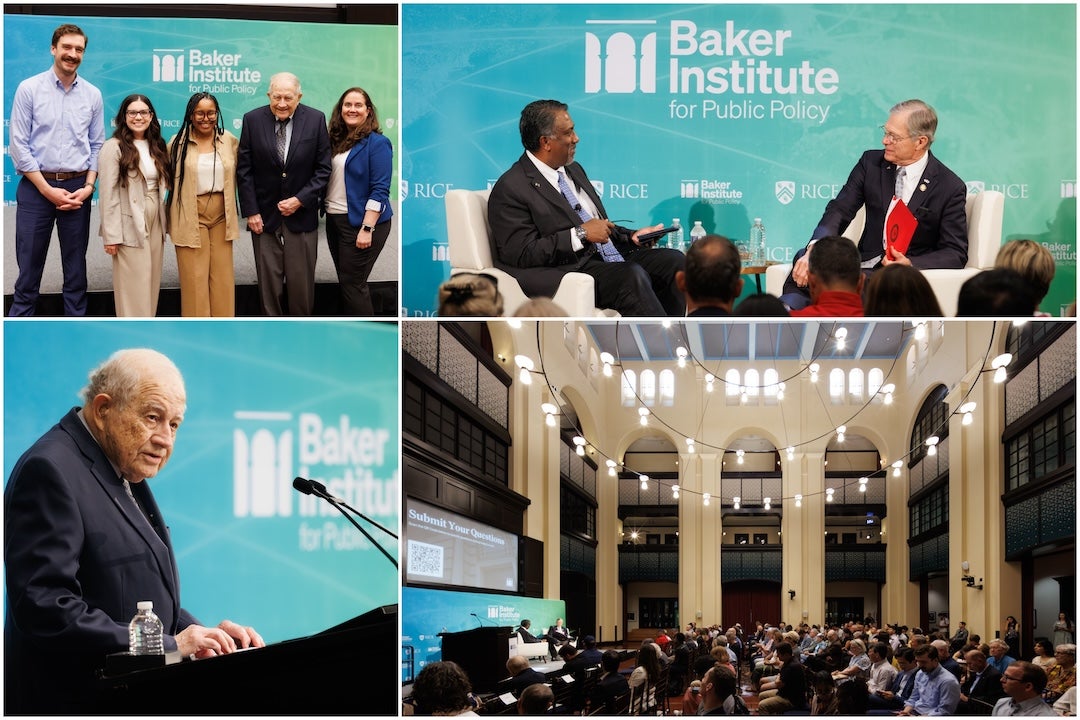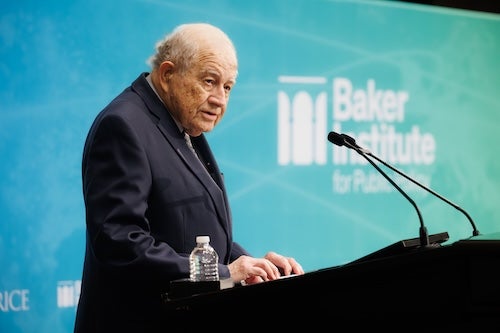U.S. Representative Dr. Brian Babin (R-Texas 36) spoke with Paul Cherukuri, vice president of innovation at Rice University, and discussed how the United States aims to remain at the forefront of space exploration, emerging technologies and scientific advancement at an Aug. 27 campus event.
The talk was hosted by the Baker Institute for Public Policy’s Science and Technology Policy program, which provides a space for policymakers and scientists to engage in substantive dialogue on critical scientific issues facing the U.S. and the world.
“Through this program, scholars address a broad range of policy issues that affect scientists and their research and highlight the vital role of science and innovation in shaping America’s future,” said Neal Lane, senior fellow in science and technology policy at the Baker Institute and professor emeritus of physics and astronomy, in his welcome address.

American science is facing enormous challenges, Lane continued. As debates surrounding funding and the path forward for science policy intensify, Babin’s perspective offered a crucial look at the current environment — he is currently chairman of the U.S. House Committee on Science, Space and Technology.
“We’re absolutely adamant about continuing our position as the No. 1 space-faring nation in the world,” Babin said to a full house in Rice’s James A. Baker III Hall. “We want to retain that also with the super important fields of quantum AI, all of the above that we’re going to have to sustain. So we don’t want to have, you know, 25% cut in space or 50% cut in science. That’s what we’re looking at.”
Earlier in the day, Babin toured a few of Rice’s labs, which included seeing how diamonds can be used for quantum and electronic applications.
“We’ve got to reauthorize our national quantum initiative, and we have to advance weather forecasting capabilities,” Babin said. “We have jurisdiction over a number of federal agencies (including the) National Weather Service and NOAA. As everybody knows in this room, we’ve had some horrible weather situations here. The last July the Fourth, we’ve probably had the worst flood maybe ever in Texas history (in) the Guadalupe Valley out there and in Kerr County. So … one of the biggest controversies about that was do we have advanced notice? Do we have proper warning? And we want to make sure that happens, and we’re working on a weather act as we speak.”
Cherukuri brought the conversation to research security, a crucial initiative for institutions of higher education, and asked how Congress is supporting the safety of intellectual property.
“This is an extremely serious problem that we can no longer look the other way,” Babin said. “We have an agenda to make sure that our science, technology and space portfolios are not compromised by malign actors. And so this is exactly what we’re trying to do … we’ve got to protect our research, our intellectual property. It’s a top priority for our district and for our committee.”
To learn more about future events from the Baker Institute and its data-driven research, visit here.

